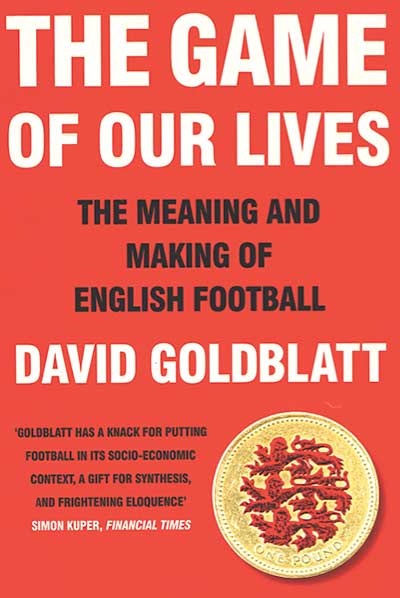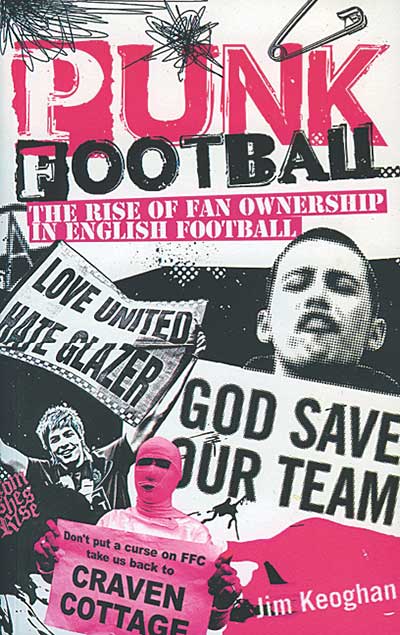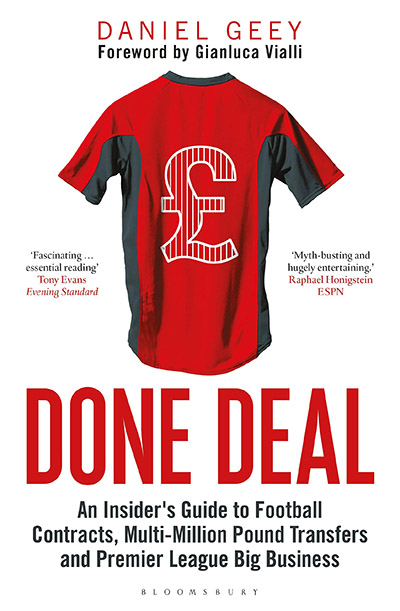Search: 'Rupert Murdoch'
Stories
 The meaning and making of English football
The meaning and making of English football
by David Goldblatt
Viking/Penguin, £16.99
Reviewed by Alan Tomlinson
From WSC 335 January 2015
David Goldblatt writes with the authority of a serious academic theorist of the globalisation process, but displays a lucidity and fluency to match the best feature journalists and sport writers. In The Game Of Our Lives he draws on specialist journalism, consultancy reports, arcane academic findings, new media and personal observations to analyse how English football has both mirrored and anticipated the broader neo-liberal agenda over the last two or three decades. Citing JK Galbraith in his conclusion, Goldblatt argues that English football represents the triumph of unaccountable affluence for the few over the many whose experiences and hopes are increasingly defined by the deprivations that denies them access to the game’s new riches.
The book confirms how swiftly the Premier League seized power in the early 1990s, and how timid the FA were in defence of the traditional values of the game. There may have been reviews, commissions and discussion of the need for serious change and modernisation; but the FA never managed to act, beyond the backing of the Taylor report for reform following the Hillsborough tragedy. Yet the consequent modernisation of grounds, in significant levels publicly funded in the name of community and civic goals, was a transformative project that Rupert Murdoch must have thought was a ruse or a booby-trap. But no, here it was on the eve of transnational satellite broadcasting: a cleansed and modernised infrastructure for him to buy into and sell on worldwide. Rarely has any besieged culture handed the battering-ram to the invasive aggressor in such a naive and timid way.
Goldblatt knows the sport too, and this is far from any dry history of the economics and politics of the game. He conveys the enduring cultural appeal of football, the resonance of matchday in the face of the forces of “fragmentation and distraction” that the new mobile media bring to bear in threatening the crowd’s “unbroken engagement and shared experience”. Analyses of the culture of the game, including the lost genius of the flawed Paul Gascoigne and the global profile of the feted metrosexual David Beckham, alternate through the book with vignettes on the political and economic realities of the emerging neo-liberal agenda. He illuminates the meaning of the game in its Premier League phase, balancing an evocation of its excellence and attractions with a critique of its financing and governance, reminding us too of the collective values that originally made football possible in its modern form, and of the game’s capacity to offer models of co-operative endeavour.
In a synthesising achievement of this scale, errors will certainly have crept in, and Burnley’s former chairman Barry Kilby is presented as “benefactor… Barry Kidder”. Wigan Athletic were formed in 1932, not “the late 1970s”, which was when they replaced Southport in the League; England’s “first defeat by a foreign team at home” was not the Hungarian lesson at Wembley in 1953, but a 2-0 loss to Ireland at Goodison Park in 1949. But this is a superb study that will surely inform and sustain debate on the nature and culture of the game, and the impact of the excesses of the Premier League upon football’s rich cultural legacy.
 The rise of fan ownership in English football
The rise of fan ownership in English football
by Jim Keoghan
Pitch Publishing, £12.99
Reviewed by Tom Davies
From WSC 332 October 2014
It is surprising that the rising supporter activism of the past three decades – from the inky anger of 1980s fanzines to the thoughtful campaigning on governance and club ownership of the supporters’ trust movement – has not been more widely chronicled. Jim Keoghan has made one of the few readable stabs at drawing all these stories together in Punk Football, which traces how fan protest has shaped the game in recent times, including where it has failed and the formidable forces it is up against.
With a useful introductory section looking at the history of how English football and its clubs came to be organised as they are, with the transition from members’ clubs to private companies that accompanied the rise of professionalism and mass spectatorship at the back end of the 19th century, Keoghan rightly places the structure of clubs at the centre of the story. So developments such as the abolition of the maximum wage, the formation of the Premier League and Bosman are given full acknowledgement.
Many of the stories here will be familiar enough – the anti-bond scheme protests at West Ham United in 1991-92, the fight to stop Rupert Murdoch’s takeover of Manchester United, the formations of FC United and AFC Wimbledon, meltdowns and fights back at Brighton, York, Portsmouth and elsewhere – but Keoghan has done an impressively exhaustive research job in talking to key protagonists about how the idea of supporter control, at club level if not, alas, at national administrative level, has taken root.
He’s not blind to where things have gone wrong – a chapter is given over to failures of varying degrees at places such as York, Notts County and Stockport, though it is debatable whether we need the one on where directors have done right by their clubs. Many of Keoghan’s interviewees also concede the underlying tension between those fans who care only about results and those prepared to be more political about it.
He looks abroad too, at the strengths and occasional weaknesses of fan ownership in Spain, Germany and Sweden, acknowledging the underlying economic and political explanations for these developments, such as the much later arrival of professionalism in Germany. That many fans in Sweden have rallied to the defence of their own model despite a lack of big club success in Europe that might have prompted a frantic dash to turbo-charged commercialism is also noteworthy.
At times it’s unclear whether Keoghan, an Everton fan, is writing for an uninitiated or deeply committed audience – do we really need the Bill Shankly “life or death” quote, the introductory blurb about the nature of fan loyalty or the apparent astonishment that a League Two game is as passionate and committed as a top Premier League encounter? In light of this, editing errors that have Rochdale and Exeter at points given the suffix “United” to their club names jar. The absence of any significant discussion of Hillsborough – the single most momentous event around which the late 1980s/early 1990s fanzine and activism boom took place – also seems curious.
The phrase “Punk Football” itself, too, woven liberally through the text, also feels a little forced. If we’re going to run with music analogies, supporter activism is now deep into its post-punk phase, the initial outpouring of unfocused anger and energy having made way for something much more creative and influential. But these quibbles do not detract from the fact that this is an important book, well balanced and accessibly written, and a very handy primer for those looking for an easy account of how organised fandom has evolved, and what they themselves can contribute. To run with the punk metaphor and paraphrase the famous 1977 fanzine rallying call, this is one football club’s story, this is another, this is a third – now run your own one.
 Rupert Murdoch blew terrestrial channels out of the water to buy Premier League rights in 1992 but he could now face tougher competition, writes Gary Andrews
Rupert Murdoch blew terrestrial channels out of the water to buy Premier League rights in 1992 but he could now face tougher competition, writes Gary Andrews
Two decades ago, Rupert Murdoch staked the success of his fledgling satellite TV business on paying £300 million for rights to the newly formed Premier League. Since then Sky has remained unchallenged in its dominance – and the sums of money are much larger – but there is a possibility they could be out-Skyed by companies looking to establish new technology in our living rooms.
 Dear WSC
Dear WSC
In answer to Jamie Sellers’ enquiry (Letters, WSC 296), no, David Needham and I are not related, although I pretended he was for a while at junior school. Also, when I went to Forest games and the Trent End chanted “Needham! Needham! Needham!” during corners (he was renowned for nodding them in), I would step forward, raise a hand, shout “Thank you, fans!” and then do that breathing-on-the-fingernails-and-buffing-them-on-the-lumber-jacket thing that boastful kids were wont to do in the late 1970s.
Al Needham, Nottingham
